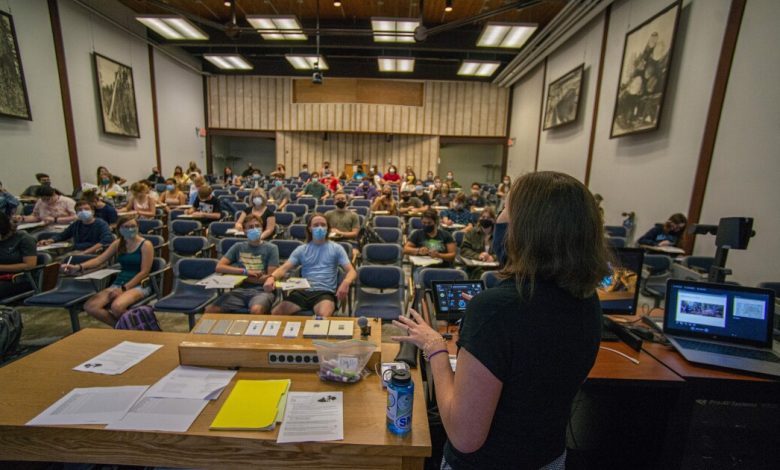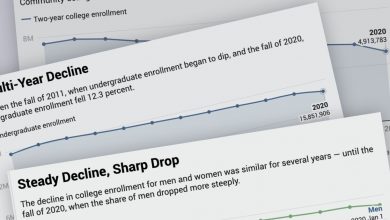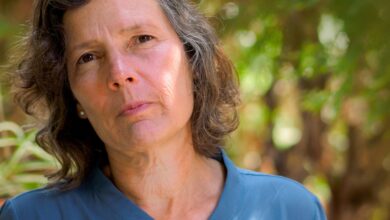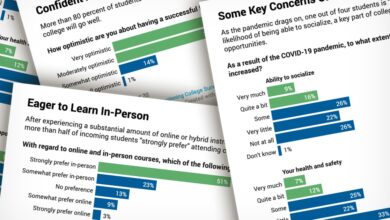Lots of Campuses Are Starting the Semester Online or Late. Here’s Why Some Aren’t.

[ad_1]
With the more-transmissible Omicron variant driving record Covid-19 case counts across the country, many colleges have opted to start the spring semester online or delay the date at which students, staff, and faculty members should come back altogether.
Those campuses have grabbed headlines this month, but most colleges are still planning to forge ahead with their spring-2022 plans and are at various stages of opening up for an in-person semester or quarter.
Last week, Dartmouth College started its semester in person, though as The Dartmouth reported, some other private residential colleges had switched to remote classes. In its late-December announcement about the decision, Dartmouth officials cited mental- and community-health concerns.
“We understand that restrictions and ambiguity can be a source of stress,” they wrote.
Younger adults, the traditional college age, have experienced a particularly acute mental-health crisis during the pandemic, according to the Centers for Disease Control. At Dartmouth, students have expressed outrage over the inadequacy of the mental-health services offered, The Boston Globe reported; last academic year, three freshman students died by suicide.
Administrators at campuses around the country are weighing mental health and other concerns with the characteristics of the new variant. Some have expressed a need to change expectations once again and encourage their communities to accept that even as cases rise higher than ever, many patients are experiencing a milder illness than in the past. These administrators echo the opinions expressed recently by several former advisers to President Biden’s Covid-19 transition team, who have urged the White House to shift its pandemic strategy to one that accepts Covid-19 as part of a “new normal.”
“We have to learn to live with this,” said Donna J. Petersen, senior associate vice president at the University of South Florida and the leader of the university’s Covid-19 task force. “As much as we keep hoping for the end, I don’t see the end. I see yet another infectious disease that’s difficult to fully suppress.”
USF started its spring semester on Monday. The dorms are mostly full, and classes are offered both online and in person. Petersen said the university set up a plan last fall she believes accommodates students and employees who need to remain remote, but allows for much of campus life to resume.
“We have infectious-disease protocols in place,” she said. “We always have. We have the ability to work with students who need special considerations.”
Petersen, who is also a public-health professor and dean of USF public-health college, said Covid-19 will soon need to be treated more like other infectious diseases, such as the flu, which are still dangerous but don’t disrupt vast swaths of everyday life. That doesn’t mean USF is not taking precautions, she said. Events have been canceled, and some meetings are still held online. Everyone is still urged to wear masks and get vaccinated, though under Florida law the university cannot mandate either.
At Morgan State University, students’ and employees’ mental health was a top concern, said Anita Hawkins, associate dean for the School of Community Health and Policy. “There are students who do well in a remote learning space,” Hawkins said. “But there are a lot of students who are seriously disadvantaged in that remote space.”
Hawkins, who has been advising the president’s cabinet on its coronavirus response, said she was looking at data on the severity of the new cases and on hospitalization rates among vaccinated people, which are less severe than they were with the Delta variant. With a highly vaccinated campus and testing and masking protocols, delaying the semester did not seem worth the disruption.
Many of Morgan State’s classes are now offered as “flex” courses, where students can tune in virtually to the in-person class. Hawkins said that has allowed students who test positive, have been exposed, or need to stay home for other reasons to avoid falling behind.
At Ohio Northern University, a small, private college in Ada, Ohio, where the campus community must be either vaccinated or participate in weekly surveillance testing, campus life will resume in person next week, as planned.
“We have been in person since August 10, 2020,” said Daniel A. DiBiasio, the president. “Our mission is in person, and if we could do that safely and maintain a healthy campus, it was our desire to do so.”
DiBiasio spoke to leaders of other residential colleges across the state of Ohio and found most planned to remain in person this spring, without changing their start dates. Like many campuses, ONU will require qualified students, staff, and faculty members to get the booster shot or participate in weekly surveillance testing.
The University of Maine will also open in person next week. Dannel P. Malloy, the chancellor of the University of Maine system, wrote to the community on Monday, saying, “it’s fair to acknowledge that a complete shutdown is not a long-term strategy.”
Maine’s campuses are also highly vaccinated. Malloy added in his message that they are some of the safest places to be in the state.
“There’s a bit of a shift from, We can tell you every single thing to do, to, We’ll do our best,” said Joan Ferrini-Mundy, the University of Maine at Orono president. The emphasis now would be on personal responsibility and flexibility. “At the same time, we all have to live with this.”
[ad_2]
Source link






